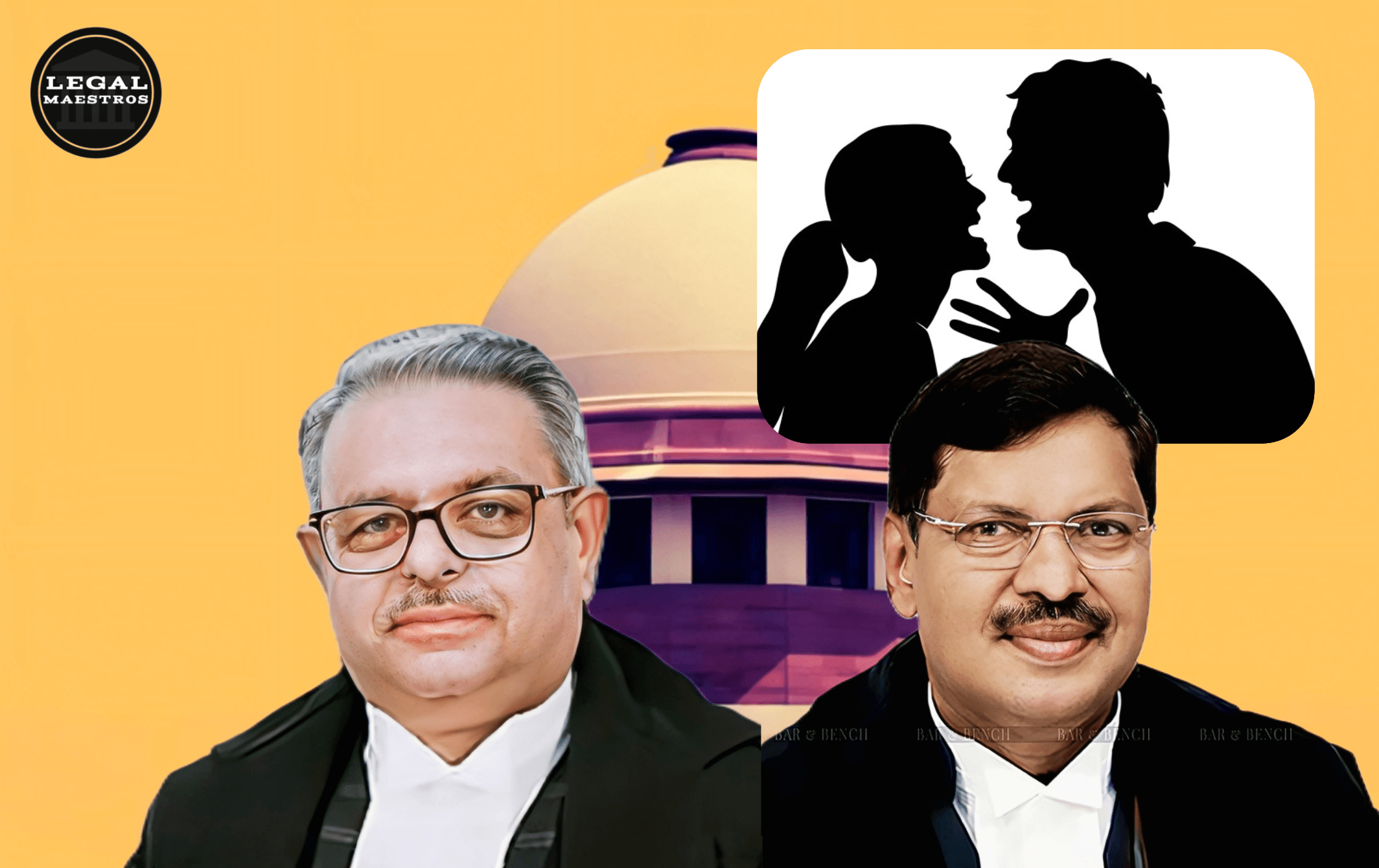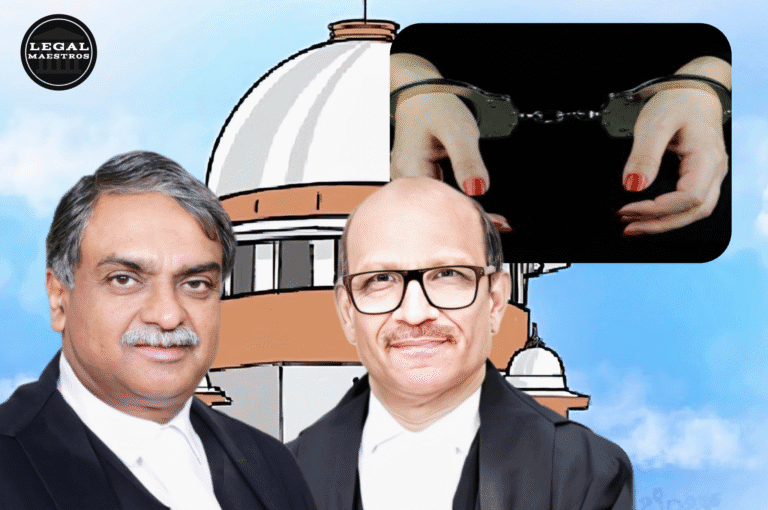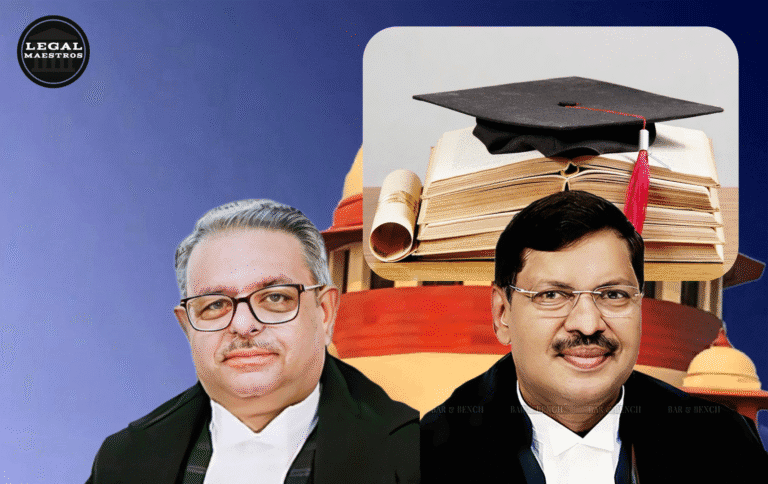
Ruling in another landmark matrimonial case on July 22, 2025, the Supreme Court of India, comprising CJI B.R. Gavai, and Justice Augustine George Masih, dispensed with a long-standing acrimonious marital battle between Shivangi Bansal (also Shivangi Goel) and Sahib Bansal. The case which consisted of a complex of civil and criminal suits at multiple courts points at the role of judicial institute in amicably settling disputes and providing full justice under the terms of Article 142 of the Constitution of India.
History of the Conflict
On December 5, 2015, Hindu marriage ceremony took place in Delhi when Shivangi Bansal and Sahib Bansal got married. On December 23, 2016, they got a daughter, Ms. Raina, who is now 8 years old. They lived in Pitampura, Delhi after getting married. Nevertheless, because of martial differences the two detached on October 4, 2018 and have not been staying together since that time. This break-up resulted in numerous law suits that were filed by both persons and their respective families.
The wife Shivangi Bansal also filed various cases one of them being transfer petition to transfer her divorce proceedings in Delhi to Hapur, Uttar Pradesh. She also filed criminal cases under different sections of the IPC and under the Dowry Prohibition Act, domestic violence and maintenance petition for their daughter who was a minor. Moreover, she petitioned special leaves against Allahabad high court orders, which cancelled FIRs against the parents of her husband.
For More Updates & Regular Notes Join Our Whats App Group (https://chat.whatsapp.com/DkucckgAEJbCtXwXr2yIt0) and Telegram Group ( https://t.me/legalmaestroeducators ) contact@legalmaestros.com.
Conversely, the husband, Sahib Bansal, wanted the move of those cases which were filed against him in Hapur to Delhi. He also made a divorce claim, a custody suit over their daughter and criminal charges such as one against defamation. His relatives also started an action. In addition to the direct parties, third parties filed incidental cases because of the matrimonial discord, which further complicated the legal situation.
The Way Court managed to solve the Situation
Both parties expressed their desire to end all future confrontations by resolving all the disputes, be it a child custody or any other litigation, amicably and finally by ending all the pending litigations, so the Supreme Court steps forward. Senior counsels appeared on behalf of the wife and the husband before the Court. The Court, taking into consideration the large number of litigation, the well-being of the child who is a minor, issued a bundle of directions in order to realize total justice.
Parental rights Stewardship and access Rights
Another major factor that concerned the Court was the welfare of the minor daughter, Ms. Raina, for whom her mother had been in the custody since the separation that had taken place in 2018. The Court upheld the custody of the child in the hands of the mother. In order to keep the father involved, Sahib Bansal, together with his family, was allowed to have supervised access to the child in the first three months. Later, under the condition of comfort and need, the father and his family might have a rights to meet Ms. Raina on the 1 st Sunday in all consecutive months, at her place of schooling between the time of 9:00 AM to 5:00 PM. They too were granted the permission of spending half of the vacation period with the child. The Court reiterated that no party is supposed to obstruct these visitation rights and the request parties to collaborate in order to promote the emotional wellbeing of the child. Any problem was to be mediated and solved by respective counsels of the parties in case of any problem.
Maintenance and Alimony
The noteworthy factor of the settlement was the financial claims. The wife, Shivangi Bansal, agreed out of her own free will that she did not want to claim alimony or maintenance out of her husband. She also did not claim any possession to any current or future movable or immovable property belonging to the husband and his family members. In turn, the Court did not issue any maintenance order to the wife.
Moreover, the wife equally accepted to be completely responsible of all the financial costs of their daughter and would not seek any maintenance of the husband on his daughter. Consequently, the decree that was given by the High Court of Allahabad which had ordered the husband to pay to maintain the child maintenance in the amount of Rs. 1,50,000/- per month was set aside and would not be binding.
Crushing of all pending Lawsuits
The Supreme Court also directed to quash and/or withdraw all the pending criminal and civil litigations which either of the parties had filed against the other including against any of the family members in any court or forum in India, in order to arrive at a final and complete settlement. Such a broad consent applied to every case in the detailed list given to the Court. Also, ancillary issues and cases brought before the court by third parties with or without relativity to the matrimonial issues were also dismissed or discontinued. The respective courts and authority were instructed to consider such proceedings as terminated and they can never be raised in future. Each side undertook that there was no other proxy proceeding pending, and that, in the event of any discovery after this proceeding, any discovery of such would be held to constitute contempt of the Supreme Court. It further provided in the order that any other case, petitions or complaints that might arise out of the matrimonial disputes whether known or unknown to the other party would also be quashed.
FutureBehaviour and Apology
In a bid to guarantee a lasting peace and tranquility, the two parties and their respective families pledged not to any future litigation, petition, case or complaint that may arise out of or that relate to these matters in any judicial, quasi-judicial, regulatory or administrative proceeding. They would also agree to withdraw all allegations and averments made in any complaints, motions, pleadings or documents they filed against each other and their relatives without any conditions.
The husband and wife also came to terms that they shall not meddle or interfere in respective lives, career or business and they shall not also engage in any act that may be harmful to respective personal or professional interests.
Another important aspect as per Court was that Shivangi Bansal and her parents need to offer an unconditional apology to the husband and his relatives. This apology will be published in the national versions of one of the English and one of the Hindi newspapers with the circulation of this apology in all the social media platforms such as facebook, instagram, and Youtube. The exact language of the apology was dictated by the Court, and this language stressed on regrets caused due to hurt and requiring peace and severance. The Court explained that such apology would not be deemed as an acceptance of responsibility and that it would not hurt any legal rights. Notably, the Court also deleted comments and notes passed against Shivangi Bansal in a judgment of High court.
Transfer and protections of property
In an unusual twist over the settlement, the wife of Shivangi Bansal called Smt. Sandhya Goel, was ordered to give certain piece of land over to Sahib Bansal by a deed of gift which was within Aligarh in Uttar Pradesh. Sahib Bansal would incur all costs of such transfer and he would take up all costs of the litigation that Sandhya Goel would be incurring regarding the property such as litigation cost. Shivangi Bansal and her family would not claim to have future rights on this land.
The Court had also given the order of the police protection to the husband and the family. In addition, Shivangi Bansal, who was an IPS officer, was specifically prohibited to work with her position or power, or that of colleagues on behalf of the husband, family members, or relatives or inflict on them physical or psychological damage.
Divorce
Based on its fantastic powers used under Article 142 of the Constitution of India, the Supreme Court directed an end to the marriage between Shivangi Bansal and Sahib Bansal in India. Accordingly a deed of divorce would be drawn up. The invoke of Article 142 has highlighted the intentions of the Court to provide full justice when there is a gap in the provision of justice based on the traditional legal system in matrimonial disputes or any other case that might extend over a long period.
The ruling can be considered an integrated resolution of a complicated matrimonial affair, covering child custody battling, financial demands, and termination of all current and prospective lawsuits. It also stresses that it is useful and necessary to settle the matter amicably pointing out the benevolence of the Supreme Court making use of their unprecedented powers to give it all a closure as also to provide peace to all the parties to this dispute with particular regard to the welfare of the minor child. The condition that has been set forth by the Court will give a clear way ahead to both the families and enhance harmonious co-existence and avoid this animosity to rise.




